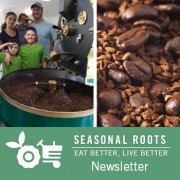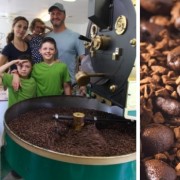Fair Trade coffee’s good for rainforests and people, too!
– By the Veggie Fairy Team
Celeste was a professional ballet dancer. Jo was a corporate IT guy. But they had always dreamed of running their own business together. And they both loved the waters of the Chesapeake Bay near their home in Virginia. Back in 2007, they’d talk about it over coffee.
“Our morning ritual has always been having our first cup of coffee together,” Celeste says. “We wanted to wake up in the morning knowing that we were working to make a difference in the world.” They decided to launch Mobjack Bay Coffee Roasters… and make it eco-friendly.
The business combines their love of coffee, family, and the water: The coffee beans are roasted right in the shop… Celeste’s father helps in the retail store while a close friend is the master roaster… and a portion of every coffee bag sold benefits the Chesapeake Bay. (Learn more about efforts to save the Bay and the challenges it faces.)
Their focus on doing good didn’t end there. As Celeste and Jo gained experience in the coffee industry, they learned coffee was the cornerstone of life for families and communities in many countries.
“We realize that it would be self-serving to only think of our front yard, the Bay, without considering our backyard, the source of our beans,” Celeste says. “So we have structured our business as a model that also supports our interests in environmental protection.”
Mobjack Bay Coffee Roasters has chosen to focus on beans grown by socially responsible farmers who follow Fair Trade and Rainforest Alliance guidelines. These are two very challenging certifications.
“At times, we must be understanding of the difficulty and length of time it takes to become certified,” Celeste explains. “In these cases, we learn about the plantations’ processes so we can make our own decisions regarding responsible purchasing. This assures us that we are thinking globally while acting locally.”
What does “Rainforest Alliance Certified” mean?
The Rainforest Alliance works to conserve biodiversity and ensure sustainable livelihoods by transforming land-use practices, business practices, and consumer behavior.
In the 1970’s coffee farmers were introduced to modern farming techniques. Forests were cleared, agrochemicals were sprayed, and yields were increased. Simultaneously, the shaded canopies of traditional coffee farms vanished. Birds and all types of animals were displaced while rivers were choked with silt and pollutants. In 1993 the Rainforest Alliance partnered with Sustainable Agricultural Network to demonstrate that traditional, forested coffee farms were the only choice for sustainable farming in harmony with nature. The Alliance helps its farmers survive the erratic global market by improving farm management and accessing premium markets.
The Rainforest Alliance Certified seal is a guarantee that coffee is grown on farms where forests are protected, and rivers, soils and wildlife conserved. Workers are treated with respect, paid decent wages, properly equipped, and given access to education and medical care. Forested coffee farms are critically important to serve as migration stopovers for birds traveling from as far away as Canada and Alaska. In areas where deforestation is rampant, these coffee farms may be the only habitat available to provide shelter and food for weary birds.
Is Fair Trade certification different?
Fair Trade coffee is a different way of achieving the same goal. We Americans are the number one consumers of coffee in the world. In the race to offer competitive pricing, the losers in the economic equation are often the people who work the hardest — the farmers who grow and pick the coffee. This forces them into cycles of poverty and debt.
Fair Trade pays farmers a fair minimum price for their coffee. Importers that are certified Fair Trade have met stringent international criteria, pay a guaranteed minimum price per pound of coffee, and empower farmers to grow sustainably. Successful sustainable farms lead to stronger communities, better health care and education, and improved stewardship of the environment. Fair Trade plants seeds of hope.
So that’s why all the beans roasted at Mobjack Bay Coffee Roasters are either source certified Fair Trade or Rainforest Alliance.
Meanwhile, Celeste and Jo also continue to support grassroots efforts to restore and protect the Chesapeake Bay. Along with their three children, they spend many days in the tributary waters that feed the Chesapeake Bay and out on the Bay itself — Jo especially, who is an avid sportsman and outdoor enthusiast.
Whole bean or ground?
In the Seasonal Roots online farmers market, Mobjack’s whole bean coffee is available in the Extras section. Plus, for the first time ever, members can swap up to two single-pot packets of ground coffee into their baskets! It’s so delicious (thanks to Mobjack’s all-American-made San Franciscan Roaster), and best of all, with every cup of joe you’re helping make the world a better place, right here at home… and far away, too.
If you’re in the area, stop by Mobjack Bay Coffee Roasters at 7060-A Woodsville Rd. in Hayes, Va., and check out their tasting room! It’s open Fridays 10-5 and Saturdays 9-4.
ABOUT SEASONAL ROOTS
Since 2011, Seasonal Roots’ online farmers market has connected Virginia families with local family farmers who use sustainable, humane practices. Our veggie fairies – mostly moms who believe in living better through scrumptious, healthy eating, being kind to animals, protecting the environment, and spreading joy – home-deliver freshly harvested produce, eggs, grass-fed dairy and meat, plus artisan fare. We empower our members to eat better and live better with more nutritious, flavorful food that’s good for us and good for the planet. More info at seasonalroots.com.



